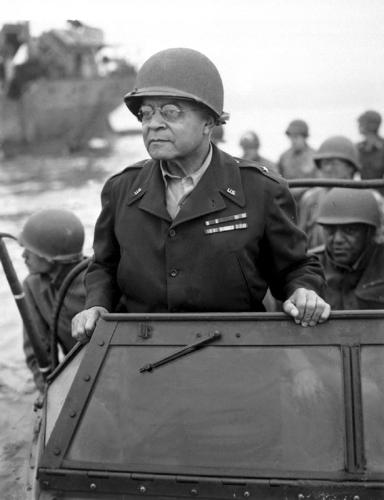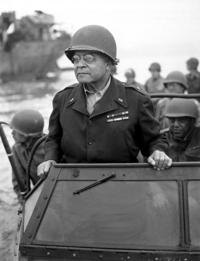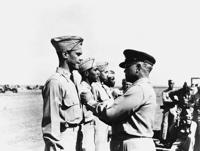(CNN) 鈥� Despite knowing they would likely be relegated to support roles due to the color of their skin, a father and son chose to make the military their lifelong career. Determined to succeed, they became America鈥檚 first Black generals.
滨苍听, Benjamin O. Davis Sr.听became听the first Black person to achieve the rank of brigadier general in the US Army.
His son, Benjamin O. Davis Jr., followed in his footsteps by joining the military and听later听commanding the听famed听Tuskegee Airmen. Twenty years after his father made history,听Davis Jr. became听the first Black brigadier general听in the Air Force听in 1960.
鈥淒avis Sr. and Jr. were both extremely influential figures in the effort to increase opportunities for African Americans in the military,鈥� said听, a history professor at the University of North Texas who directed the National Park Service鈥檚 Tuskegee Airmen Oral History Project in the early 2000s.
Black people have held roles in the US military since the Revolutionary War,听even as they have endured racism and discrimination for centuries. During the Civil War, Black soldiers听served in听听and were later shut out of leadership opportunities during World War I and听in听World War II, when less than 10% of veterans were non-White,听
Davis Sr. was born in Washington, DC,听less than 20 years听after the听ratification of the听13th听amendment, which听abolished slavery.
After participating in his high school鈥檚 cadet program, Davis Sr. joined the military听during the Spanish-American war,听serving in the DC鈥檚 National Guard听with听the 8th US Volunteer Infantry regiment before enlisting in the Army in 1899, according to the听.
He听was assigned to the all-Black听,听one of the four regiments that became known听as听the听Buffalo Soldiers, and he served in the Philippines and听at听the US-Mexico border.听Like many Black service members, Davis Sr. did not听serve on the front lines during World War I and instead worked as a听.
A听听falsely听concluded that Black people lacked听the听intelligence, ambition and courage to serve in prominent positions within the US military and should not be placed over White officers or soldiers.听This policy and the ideology behind it prevented many Black soldiers from advancing through the military鈥檚 ranks, including Davis Sr., who was continuously assigned to serve as professor of military science and tactics despite his strong preference for duty with troops.
鈥淗e got bounced around from post to post, and to ROTC leadership roles on campuses around the country, mainly because the Army felt like an African American just could not lead White soldiers,鈥� Moye said. 鈥淭hey thought that White soldiers and lower-level White officers just could not be expected to take orders from a Black man. So, there were very few opportunities for him.鈥�
He was collectively shunned听for听4 years at West Point
Davis Jr. grew up watching his father鈥檚 courage to fight for his ambitions in the face of discrimination. It became something that he听himself听would mirror time听and听time听again through his adult life.
Davis Jr. put his dream of becoming a pilot aside and chose to become a military officer by attending West Point. Securing a nomination was complicated.听Rep. Oscar S. De Priest of Illinois, the first African American elected to Congress in the 20th听century, was willing听to听nominate him but听could听only听select a candidate from among听his constituents.听So, Davis Jr. moved alone to Chicago for nearly two years to secure听the nomination and听his spot at West Point.
In 1932, he received orders to report to West Point and four years of shunning began.听He听roomed alone, ate by himself in the cadet mess hall and n听except on official business. This treatment was usually a punishment that cadets carried out against those who violated the honor code but in听, Davis Jr. wrote that he was 鈥渟ilenced solely because cadets did not want Blacks at West Point.鈥�
鈥淭heir only purpose was to freeze me out. What they did not realize was that I was stubborn enough to put up with their treatment to reach the goal I had come to attain,鈥� he added.
When he graduated听in the top 12%听of his class in听1936, Davis Jr. was the听听to graduate from West Point and the first one to do so听.
But with no opportunities for Black officers to fly,听Davis Jr.听joined an infantry regiment. Like his father, he later became a professor of military science and tactics at听what was then called the听Tuskegee Institute.
Doug Melville, Davis Jr.鈥檚 great-nephew who听recounts the Davises journey and legacy in his book听听said the father and son听spent four years traveling听together听to Black colleges and training young men looking to join the Army.
鈥淭hey were telling them: 鈥極ne day your time will come, keep your chin up, look straight ahead and be ready,鈥欌€� he said. 鈥淯ltimately those are the men that Ben Jr. recruited to become the Tuskegee Airmen.鈥�
WWII drove social change and a breakthrough for听Black soldiers
The opportunity they had been preparing for came in the early 1940s as it became clear that the US would be entering听World War听II听and Black workers threatened to march on Washington, protesting job discrimination and segregation in the military.
On October 25, 1940,听Davis Sr. was听temporarily听听by President Franklin D. Roosevelt. Months later, Roosevelt signed an executive order creating the Committee on Fair Employment Practice to prevent discrimination in defense and government jobs.
Moye said the overall changes in the military, including Davis Sr.鈥檚 promotion, were significant because until that point, the Army鈥檚 position had been to deny Black Americans opportunities to advance, much like the rest of society听at the time.
鈥淎merican schools are segregated, American churches are segregated, all of these other institutions in America are segregated (and) the Army shouldn鈥檛 be expected to be out in front of all of those other institutions,鈥� Moye said,听referring to how the armed forces viewed their role in the nation鈥檚 desegregation movement.
鈥淪o, (the Army) provided no opportunities for African Americans to lead troops, it provided no opportunities before 1940 for African Americans to fly airplanes, there were no African Americans in the Marine Corps,鈥澨齅oye added.
In 1942, Davis Jr. graduated in the first class of pilots听in a newly-created unit of Black military aviators at Alabama鈥檚 Tuskegee Army Airfield 鈥撎齛 unit听now known as the听. 听That August, he assumed command of the 99th Fighter Squadron, the first unit of Tuskegee Airmen, which engaged in combat in North Africa and Sicily.
Although the Tuskegee Airmen were aware they were breaking racial barriers and making history, Moye, who has met and interviewed many airmen over the years, said听their motivations varied.
鈥淎 lot of them say 鈥業 just wanted to be a pilot and, you know, the other stuff was sort of extracurricular to me,鈥� but a lot of them wanted to do it because they wanted to break barriers,鈥� Moye said. 鈥淭hey wanted to prove that African Americans could do everything that听White Americans could do.鈥�
Following the success of the Tuskegee Airmen during WWII, Davis Jr.听听upon its split from the Army.
In 1948,听President Harry S. Truman issued an executive order听creating the President鈥檚 Committee on Equality of Treatment and Opportunity in the Armed Services, leading听Davis Jr.听to become听directly involved with integration efforts听in the US Air Force,听Melville said.
While his father retired from the military before the start of the Korean War, Davis Jr. served during both听the听Korean and Vietnam Wars.听In 1960,听he became听the first听Black brigadier general in the US Air Force.
He retired a decade later.
The fight for equality went on
While the generals broke barriers and successfully听fought听for the advancement of Black Americans, change and increased opportunities have been slow to take听hold听in the military and beyond, scholars and historians told CNN.
Black men are currently听听in the US military when compared to the civilian labor force, but they remain underrepresented in officer ranks, CNN听听in 2020.
Le鈥橳rice Donaldson, an assistant professor of history at Texas A&M University Corpus Christi whose research has focused on African听Americans听in the听military, said the lack of combat experience remains a challenge for the advancement of Black service members.
鈥淚n order to move up and become a general you need a certain level of combat experience and African Americans are almost always shuffled into transport or support staff divisions, and that is going to limit your ability to be promoted,鈥� Donaldson said.
After retiring from the military,听Davis Jr., like other Tuskegee Airmen, sought to continue flying as a commercial pilot but the career听he听expected to have never materialized. Melville said听he听applied for jobs at multiple airlines but never听received an听offer, despite his accomplishments.
Still, he found a way to stay involved in aviation. In the 1970s, Davis Jr. was named听听for the Department of Transportation, where he led the implementation of measures to counter aerial hijackings and oversaw the training of agents of what now is known as the Federal Air Marshal Service.
In 1998, President Bill Clinton promoted Benjamin O. Davis, Jr., to the rank of four star general, describing him during the ceremony as 鈥渁 hero in war, a leader in peace, a pioneer for freedom, opportunity and basic human dignity.鈥�
鈥淥ur armed forces today are a model for America and for the world of how people of different backgrounds working together for the common good can perform at a far more outstanding level than they ever could have divided,鈥� Clinton said.听 鈥淧erhaps no one is more responsible for that achievement than the person we honor today.鈥�
Throughout their lives, the Davises were devoted to their families and never sought the spotlight. Melville听recalled听Davis Jr.鈥檚 kindness and how he never wanted to share his past or photos with him听and that he didn鈥檛 have听military regalia in his house.
Years after Davis Jr.鈥檚 passing, Melville听began听researching his family鈥檚 history 鈥� details that had never been shared with him.听He wrote in his book that,听at听his听core,听Davis Jr.听had a deep desire to overcome discrimination and be known as a general in 鈥渁n equal way to all others, without qualifiers.鈥�
鈥淥ur family went beyond what they needed to do in order to invest in a country that really wasn鈥檛 investing in them but they still believed it was the best country in the world, and still believed that positivity and sunlight will shine for our people and that we will earn our place as Americans,鈥� Melville said.
The-CNN-Wire
鈩� & 漏 2024 Cable News Network, Inc., a Warner Bros. Discovery Company. All rights reserved.
















